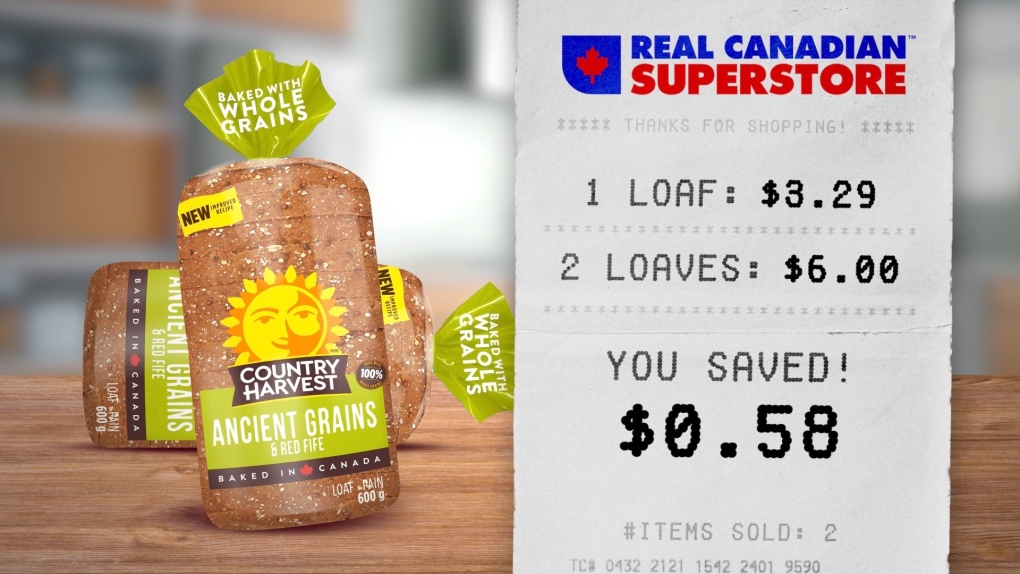Does buying food in bulk actually save you money?
With the rising cost of groceries, many shoppers are looking for ways to save money at the checkout.
Some say that buying in bulk may be the solution, but experts caution that it may not always be the best option.
Trish Rogers is buying more, to try to save money.
"I try to plan ahead, and honestly, it saves money in the long run and fewer trips to the grocery store," Rogers says.
She got a great deal on cat litter by buying multiple jugs. One jug was $8.99, but she bought two for $12.00.
"If you’re going to be using the product often, I think it's worth it to buy it," says Rogers. "Because you can save two or three dollars."
However, for some shoppers, they aren't interested in the "buy more, save more" tactics and say people end up overspending.
"They come into the grocery store hungry and they leave full, too full. Because they buy more than they need," shopper James Greig says.
Karina Delle Palme, another shopper, adds, "Whatever I need for tonight, I won't need for tomorrow, and I eat it tonight, and then I go back the next day. Just because I feel like I save a little bit more money in that regard than it would say buying it in bulk."
Grocery stores have been offering these types of bulk deals for years.
For example, this week, Metro offers two bags of Lays chips for $7, saving shoppers $1.98.

At Walmart, three boxes of Ritz crackers go for $7, saving shoppers $1.34.

At the Real Canadian Superstore, buying two or more loaves of bread brings the price down to $3.00 each, whereas one loaf alone is $3.29.

At Loblaws, you can get two bottles of Palmolive dish soap for $5.50, saving shoppers $1.48 (regular price $3.49 each).

Sylvain Charlebois, director of the Agri-Food Analytics Lab at Dalhousie University and a professor of food distribution, cautions that bulk buying may not be the best solution for everyone.
"Getting people to buy too much food could actually end up costing you more for two reasons. You may actually be paying more, but also you'll be wasting more as well."
Those food waste dollars can add up. It’s the largest cost to most households.
Buying things you can freeze, canned food, or non-perishables like toilet paper is the safest way to save money on bulk items to avoid throwing away money.
"Most stuff I freeze, so it's ready. Like Loblaws lasagna, just throw it in the freezer. So it's good forever," says Bob Cassidy.
Chris Blouin, another shopper, adds, "I usually keep everything that I buy and use it for whenever I need it. And try to use everything and try not to waste as much as possible."
For Trish Rogers, she says she will take bulk deals whenever she can.
"I tend to do it on products that don't spoil quickly," Rogers said. "And of course, it saves money in the long run."
CTVNews.ca Top Stories

India's 'most wanted terrorist' arrested on gun charges in Canada
One of India's most wanted terrorists has been arrested and charged in connection with a recent alleged shooting in Ontario.
12-year-old boy charged in stabbing of 11-year-old boy at Edmonton McDonald's
The boy stabbed at a north Edmonton McDonald's last Friday is 11 years old.
What makes walking so great for your health and what else you need to do
Medical experts agree that walking is an easy way to improve physical and mental health, bolster fitness and prevent disease. While it’s not the only sort of exercise people should do, it’s a great first step toward a healthy life.
U.S. Congress hosts second round of UFO hearings
The U.S. government held another UFO hearing on Capitol Hill on Wednesday, the second such hearing in 16 months. This hearing was billed as an attempt by congress to provide a better understanding of what is known about previous sightings of UFOs, also known as UAPs (Unidentified Anomalous Phenomena).
Toronto teenager charged with first-degree murder in Kitchener, Ont. homicide
A Toronto teen has been charged as part of an investigation into Kitchener, Ont.’s first homicide of 2024.
Spy service officer denies threatening Montreal man who was later imprisoned in Sudan
A Canadian Security Intelligence Service official has denied threatening a Montreal man who was later imprisoned and allegedly tortured by authorities in Sudan.
Donald Trump picks Florida Rep. Matt Gaetz to serve as attorney general
President-elect Donald Trump on Wednesday said he will nominate Republican Rep. Matt Gaetz of Florida to serve as his attorney general, putting a loyalist in the role of the nation's top prosecutor.
This Canadian airline will adopt Apple's new AirTag feature to help recover lost baggage. Here's how
Apple announced that a new feature, 'Share Item Location,' will help users locate and recover misplaced items by sharing an AirTag location with third parties including airlines.
Canada bracing for 'tough' talks as Trump's pick calls northern border an 'extreme vulnerability'
The Canadian government is aware it's likely in for 'tough conversations' with U.S. president-elect Donald Trump's administration, after his border czar said there is 'an extreme national security vulnerability' he intends to tackle at the Canada-U.S. border.


































